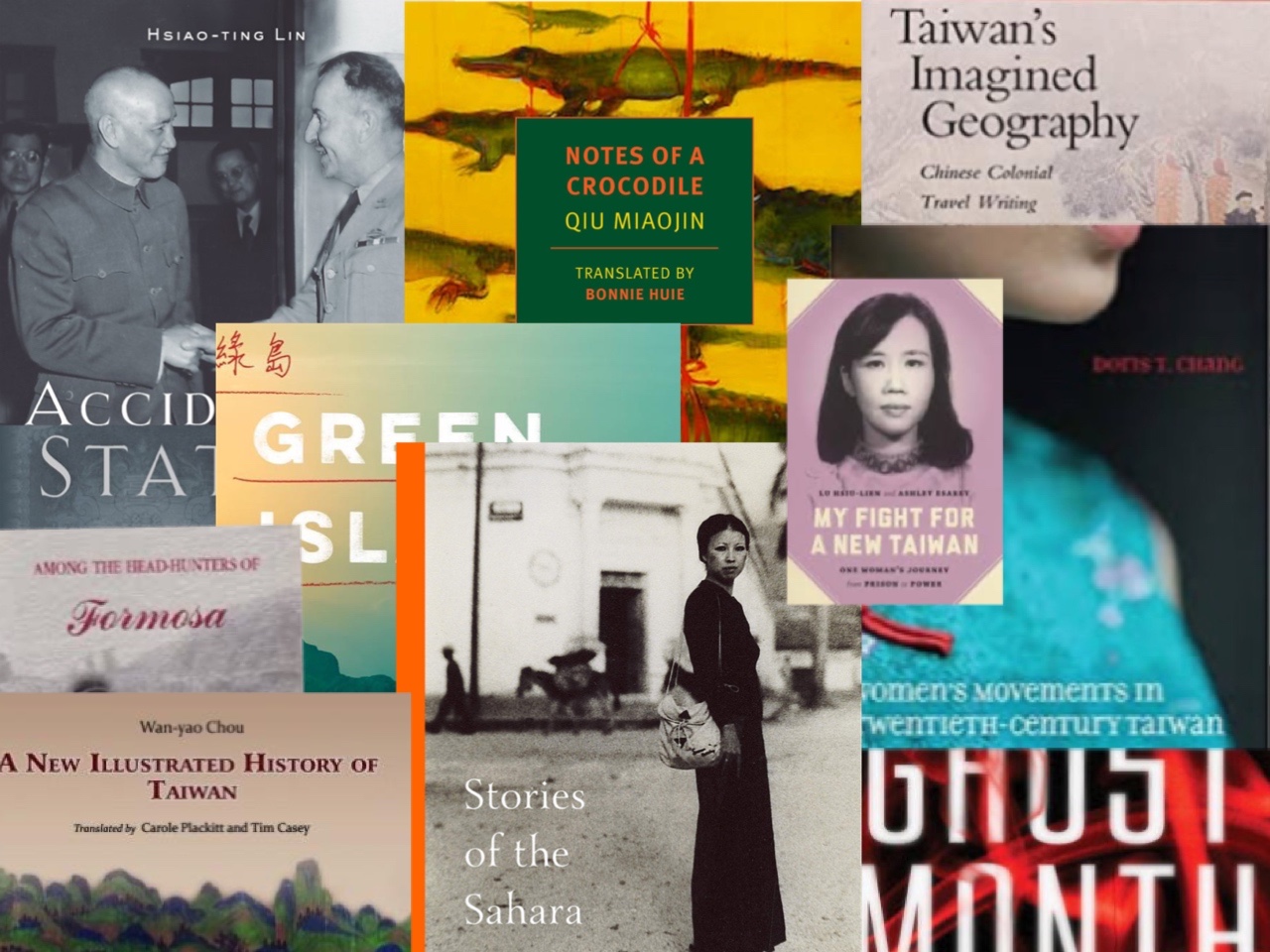
Yes, I know I can write about Tsai's inauguration. I can write about how Johnny Chiang's promises of KMT reform are disingenuous. I could write about Hong Kong - and re-iterate that this was inevitable, as what Hong Kong wants for itself will never align with China's plans - but I've already cried once over it.
In fact, with my dissertation looming, please don't expect much from me this summer. I do have to get it done, and can't give Lao Ren Cha as much attention as I'd like until it is. On the upside, I have a lot to say about education in Taiwan as a result of my research.
So instead, let's do this.
Brendan has made the very astute point that people who espouse pro-China views (or anti-Taiwan views) tend to want you to unquestioningly accept their bottom lines - whether that's "Taiwan must be the ROC", "Taiwan is a part of China" or "the ROC is the real China and Taiwan is a part of it". The only book recommendation I've actually seen from one of these types is The Generalissimo, a ridiculous hagiography of Chiang Kai-shek.
Whereas if you spend any time with your average pro-Taiwan politics junkie, they'll throw so many book recommendations at you that you won't know where to begin. They'll tear each other's arguments apart, and then rebuild them to be better. They'll swipe at, say, the Hoklo chauvinism or the bad history of a purely Marxist perspective, of previous generations of activists and create something better. All the while, they'll want you to read, read, read. Read things that contradict other things! Talk about the contradictions! Discuss! Read! Learn more!
Even if I weren't already strongly pro-Taiwan, it seems clear to me that the side that is excited for you to learn more is probably the right one.
With that in mind, it's occurred to me that people who want to learn more may not know where to start. I also have this list in a public Facebook album, and you are cordially invited to join Books About Taiwan: Discussion and Nerdiness.
I aimed for a wide variety of reading material: three memoirs, three works of fiction, three era- or social-issue specific histories and one general history - the one I recommend out of all of the "histories of Taiwan" out there.
If you want to know more about Taiwan but don't know where to start...well, here is where you start:
1.) Green Island
Shawna Yang Ryan

Why I love this book: it’s a highly engaging novel that takes the reader through Taiwanese history, starting on 228 (if you don’t know what “228” is, all the more reason to read it) and ending at the SARS outbreak of 2003. The family is fictional but they could easily be an everyday Taiwanese family - and it’s unpretentiously written. It’s highly realistic and was written from a place of deep knowledge, quoting Chinese poetry and taking a cue from Midnight's Children when it comes to the birth of the unnamed protagonist. And, because Taiwanese history can be so heartbreaking, it made me cry a few times.
Why you should read this book: Taiwanese history is complex and often sad, and non-fiction books usually fail to capture the ‘feel’ of it. This is a novel, so there’s a plot that keeps it moving. If you ever wondered what ‘Taiwan’ is really like, as a mood, a palette, an atmosphere - this is the book for you. While the characters are fictional, the historical events they experienced are not, and the experiences they have are quite typical. 21st century Taiwan differs somewhat from the mid-century depictions in this novel - in part because Taiwan is more developed now than it was then - but honestly, the ‘atmosphere’ is still here.
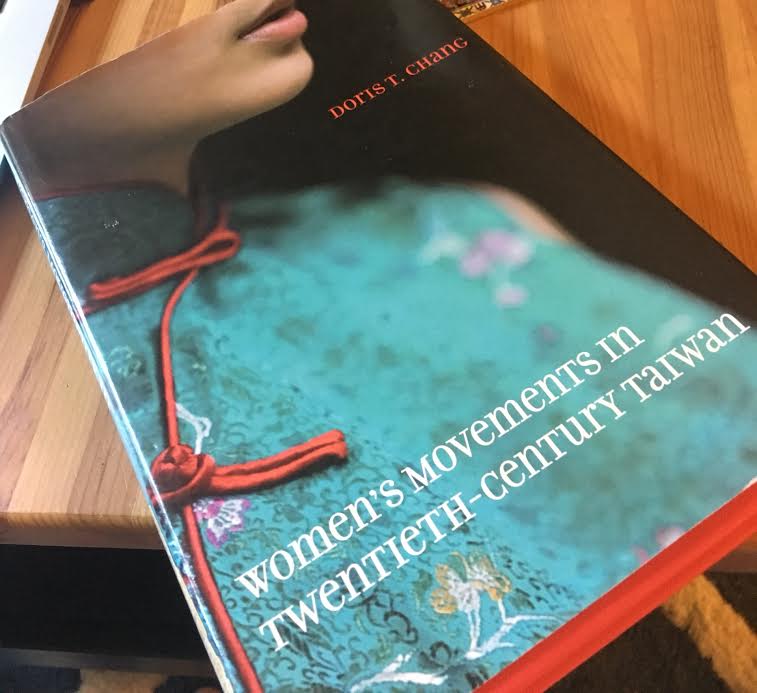
Why I love this book: despite weird references to the ‘mainland’ (Taiwan has no mainland) and other quirks of language, this book really clarified for me how Western-style feminism is related to, but not the same as, feminist movements as manifested in different parts of Asia. Unlike many authors, Chang keeps her narrative in Taiwan for the entire 20th century, and discusses women’s movements in Japanese colonial Taiwan (some would start such a narrative in China, and talk only about the Republic of China, which is problematic in light of established Taiwanese identity).
Why you should read this book: this book clarifies that feminism isn’t some new imported idea in Asia or Taiwan. It’s been around for awhile and been developed by local activists. Taiwanese culture has undergone several phases of women's movements and survived - patriarchy and sexism aren't facets of a culture, they are an external framework of injustice imposed upon cultures. Women’s equality is a human issue, not a Western one.
Also, while academic, it's a slim volume and highly readable.
3.) Notes of a Crocodile
Qiu Miaojin

Why I love this book: the atmosphere of student life in 1990s Taipei, the crocodile allegories (which I liked more than the main story) illustrating what life was like for gay people being both objects of fear and obsessive curiosity if not imitation, the refusing to stereotype any LGBT characters, the description of love as the act of ultimate vulnerability. College kids of different orientations figuring out who they are and what that means against the backdrop of a country figuring out who it is and what it wants. This book explores identity, otherness and finding your way in your early adulthood, as well as the excruciating vulnerability of love, and how some people simply cannot open themselves up for that long.
I didn’t always understand the main character’s motivations, so I never properly reviewed this book as I felt unqualified to do so.
Why you should read this book: for all those reasons. Also, it’s short but impactful. As a straight white foreign resident in Taiwan, it was an appreciated window into the voice (and presumably fictionalized inner life) of a gay Taiwanese woman. I might not know how to review this book properly, but I am grateful for the opportunity to have read it.
4.) Taiwan's Imagined Geography: Chinese Colonial Travel Writing and Pictures, 1683 to 1895
Emma Jinhua Teng

Why I love this book: it’s an engaging non-fiction read from a unique angle: not a straight history of Taiwan but looking at it as seen though the eyes of Chinese colonial writing about it. That word ‘colonial’ is key: the way Taiwan was depicted by these writers - “a ball of mud beyond civilization”, an “island of women”, a frontier barrier wilderness kept more for defense of ‘China’ than any real interest in Taiwan as a place - show how not Chinese Taiwan really was, even when it ‘belonged’ to China.
It brings to mind Chinese attitudes to Taiwan now - and I believe Teng wants us to make that connection.
Why you should read this book: non-fiction this engaging is rare. Also, it offers, through the eyes of Taiwan's Chinese colonizers, a conceptual basis for why a Taiwan is the way it is today. Chinese colonial attitudes have not gone away.
5.) My Fight for a New Taiwan: One Woman's Journey from Prison to Power
Lu Hsiu-lien (Annette) and Ashley Esarey

This choice narrowly beat out the classic Formosa Betrayed. So why this autobiography of a polarizing political figure rather than a recounting of the 228 Incident so well-known it was made into a movie? Not only because, like her or not, Lu is a Taiwanese voice, but also because 228 is pretty well-covered in other books on this list, and women's experiences tend to get the short shrift overall. Also, George Kerr described what he saw, but Annette Lu changed Taiwan.
Annette Hsiu-lien Lu is a controversial figure in Taiwan politics, and I can't say she is someone who is suited to a leadership role in 21st century Taiwan (among other things, she has outdated views on LGBT issues and marriage, and...well...it would take a long time to explain why she's seen as such a headache. That view of her is not entirely undeserved.)
Annette Hsiu-lien Lu is a controversial figure in Taiwan politics, and I can't say she is someone who is suited to a leadership role in 21st century Taiwan (among other things, she has outdated views on LGBT issues and marriage, and...well...it would take a long time to explain why she's seen as such a headache. That view of her is not entirely undeserved.)
However, she deserves credit for being a leader of Taiwan's nascent non-party-affiliated feminist movement in the 1970s. Gender equality in Taiwan would not be where it is today without her work then, and she deserves credit for that. She also paved the way for women in political leadership by serving as Chen Shui-bian's vice president. She is one of the few feminist activists in Taiwan to 'take sides' politically and stand against the KMT.
Her autobiography is engagingly written and compulsively readable. Just keep in mind that as an autobiography, it is also something of a hagiography, and does not depict the 21st century complexity of Lu as a person or politician. It is fascinating, however, when she talks about her formative years and her awakening interest in feminism and activism.
You may not like her (I don’t, really) but Taiwan would not be what it is without her.
6.) A New Illustrated History of Taiwan
Wan-yao Chou
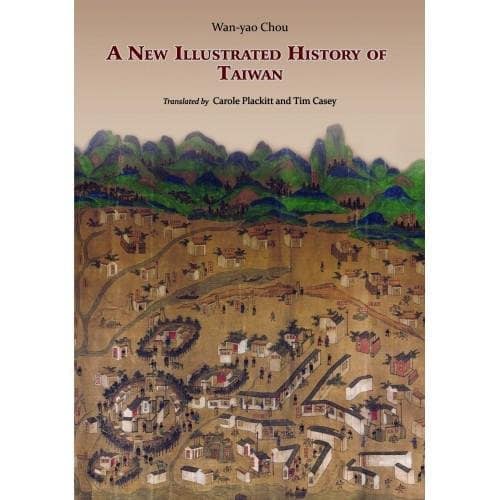
To be honest, in order to choose the best general history of Taiwan, I skimmed all the ones we own. The most concise may be Forbidden Nation, but it focuses too much pn foreign notables in Taiwan and not enough on local efforts. Taiwan: A New History is a bit dry.
Other books - by Taiwanese and more focused on Taiwanese people (such as Taiwan: A History of Agonies and Taiwan's 400 Year History) were written as much as political manifestos as actual histories. They either neglect Indigenous history, are openly offensive towards it, or portray Indigenous-Hoklo relations through a distorted ideological lens that simply isn’t accurate.
Chou is the only writer who centers the Taiwanese in their own history and is most inclusive of Indigenous history.
If you are going to read a general history of Taiwan, I think this is the best choice.
Janet B. Montgomery McGovern
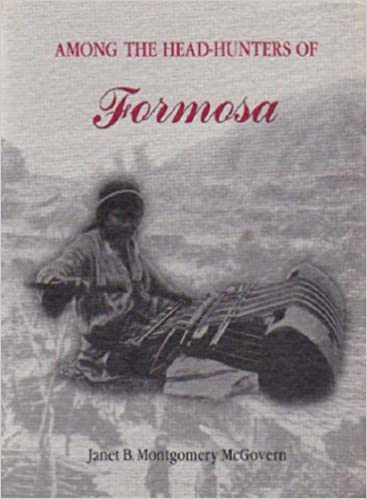
I can't do this book justice in a short blurb - instead, go read my original review, linked above. Progressive for her time, McGovern was one of the few Westerners invited to live in Taiwan during the early/mid-Japanese colonial era, as a teacher. A trained anthropologist, she spent her free time becoming familiar with - and forming connections with - Indigenous groups that Hoklo and Japanese alike thought were ‘dangerous’ or ‘savage’ (though when one treats Indigenous people as badly as those two groups did, what could one expect?). Despite the name of the book, she describes the people she met with more respect and equanimity than almost anyone of her era.
Plus, she was funny, and a good writer, and an intrepid feminist.
8.) Ghost Month
Ed Lin
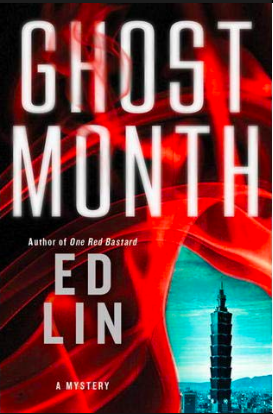
I wanted to include at least one fiction novel set in more or less contemporary times (the other two fiction choices were either written in the 1990s, or are mostly about the 20th century) which is a light, easy, fun read that still captures the vibe of Taiwan.
Ghost Month is that book - there are other great novels out there in English (like Bu San Bu Si, which was also a strong contender as it's quite possibly the best fiction novel about Taiwan written by a non-Taiwanese, but calling that book "a downer" is a massive understatement), but sometimes it’s fun to read an action/mystery in a Taiwanese setting and call it a day. Highly engaging and not as dark or overly metaphorical as a lot of Taiwanese fiction, I think it’s highly accessible to Western audiences, too.
Do you want to know what life in the city I call home is basically like, in the 21st century? It's...kind of like this, with less murder.
9.) Accidental State
Hsiao-ting Lin

Another historical look at a specific time period, Accidental State looks at the dynamics of the US, China and Taiwan to unravel the threads of why Taiwan has the status it does vis-a-vis nationhood, pointing out that nobody wanted or intended for things to turn out this way, and that Taiwan-as-ROC (or any form of ‘China’) was not a foregone conclusion at the time. It is a lie to say that Taiwanese identity and the independence movement was born in the 1970s - it wasn't. There were home rule movements far, far earlier than that. It is also a lie to say that there was no chance, historically speaking, of a post-war independent Taiwan. It was one of the options on the table, at least briefly.
This is the one to read if you know deep down the KMT is full of trash but aren’t sure of the historical specifics of why, or if you’re confused about the tumultuous decades around WWII. Or if you’re a good-hearted person who is wrong in thinking Taiwan’s destiny must be Chinese, but are willing to read and revisit those beliefs. Or, if you're curious where this whole "Taiwan is eternally Chinese" idea came from (mostly Chiang himself, who managed to convince the Allies that accepting this was in their strategic interest).
Most of the arguments I’ve had with numpties online could have been avoided if they’d read this book.
It’s not the only source on the era but it is the clearest.
10.) Stories of the Sahara
Sanmao

I’ve just started reading this, so don't expect a long review (yet). That said, I feel comfortable recommending it - Sanmao (三毛) is one of the great writers of the 20th century, inspiring a generation of adventurous women in Taiwan and China. But until recently was ignored by English-language publishers. This new translation of her most famous masterwork is compulsively readable.
*
Now I want to hear from you - what would you add to this list if you could? Was I unfair in choosing Annette Lu over George Kerr? What niche era of history or social change have I overlooked? Which novel did I snub? You tell me!
Now I want to hear from you - what would you add to this list if you could? Was I unfair in choosing Annette Lu over George Kerr? What niche era of history or social change have I overlooked? Which novel did I snub? You tell me!

I would add:
ReplyDeleteIndigenous Writers of Taiwan - An Anthology of Stories, Essays, and Poems
Edited by John Balcom and Yingtish Balcom. Translated with an introduction by John Balcom. Columbia University Press.
and
Outcasts of EmpireJapan's Rule on Taiwan's "Savage Border," 1874-1945by Paul D. Barclay
Great choices!
ReplyDeleteMy runners up were Formosa Betrayed, Taipei People, Lost Colony and Bu San Bu Si, but those are also deserving. There are several books on national identity and Taiwanization that I also like, but I honestly couldn't choose among them.